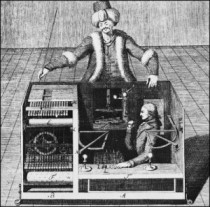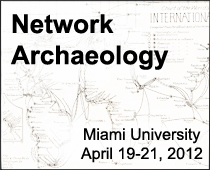Posts Tagged: cybernetics
Dolphins, Drugs and Circuitry: Network-building in Postwar Interspecies Communication Research
Presentation by John Shiga (McGill University). In the 1950s and 1960s, renowned neurophysiologist, John C. Lilly, received funding from several U.S. government agencies including NASA and the U.S. Navy to conduct experimental research on the feasibility of human communication with dolphins.
Dolphins, Drugs and Circuitry: Network-building in Postwar Interspecies Communication Research
Presentation by John Shiga (McGill University). In the 1950s and 1960s, renowned neurophysiologist, John C. Lilly, received funding from several U.S. government agencies including NASA and the U.S. Navy to conduct experimental research on the feasibility of human communication with dolphins.

Circuits of Cognitive Automaton
Presentation by Ayhan Aytes (UC San Diego). In the history of the automation of intelligence, the concept of the automated chess-player frequently appears as a metaphor, abstract machine, behavioral prototype or a thought experiment. In almost every conceptual implementation of

Circuits of Cognitive Automaton
Presentation by Ayhan Aytes (UC San Diego). In the history of the automation of intelligence, the concept of the automated chess-player frequently appears as a metaphor, abstract machine, behavioral prototype or a thought experiment. In almost every conceptual implementation of
Medea Archaeology, or Inhuman Interconnections and their Monstrous Milieu: Ancient and Modern Cybernetics
Presentation by Dan Mellamphy (University of Western Ontario). Pythagoras, father of digital technology (via his mathesis universalis the tetractys), believed in the trans‐human ‘love and pursuit of wisdom’, coining a word for the latter (namely φιλοσοφία) and suggesting that the
Medea Archaeology, or Inhuman Interconnections and their Monstrous Milieu: Ancient and Modern Cybernetics
Presentation by Dan Mellamphy (University of Western Ontario). Pythagoras, father of digital technology (via his mathesis universalis the tetractys), believed in the trans‐human ‘love and pursuit of wisdom’, coining a word for the latter (namely φιλοσοφία) and suggesting that the


